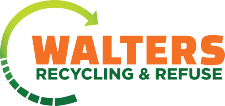Composting
Acceptable + Non-Acceptable Materials
Here are a few lists of what should be composted, and what should not.
Acceptable Organics Recycling
Food waste and food-soiled paper are called organic waste. It includes:
- Food Scraps
- Fruits & Vegetable scraps
- Meats, fish & bones
- Bread, pasta, & baked goods
- Spoiled leftovers
- Egg and nut shells
- Dairy products
- Tea leaves (staples removed)
- Coffee grounds
- Food-soiled paper products
- Paper towels & napkins
- Paper plates & cups (uncoated)
- Soiled Pizza boxes
- Paper Egg cartons
- Tea bags (staples removed)
- Coffee Filters
- Other Compostable Items
- Tissues & cotton balls
- Floral trimmings & house plants
- BPI-Certified materials
Non-Acceptable Materials for Organics
These items should not go into your organics bag
- Twist Ties
- Plastics
- Plastic bags
- Glass
- Metal
- Styrofoam
- Foil / Aluminum
- Straws
- Microwave Popcorn bags
- K-Cups from single serving Coffees
- Diapers or wipes
- Pet Droppings – Kitty Litter
- Feminine Hygiene products
- Cigarette butts
- Rocks or bricks
- Automobile & engine fluids
- Band-Aids or first aid items
- Batteries
- Candles or wax
- Candy or chip wrappers
- Rubber wine corks
- Gum
- Garden Trimmings or Yard waste
- Juice boxes or Pouches
- Chalk, crayons
- Markers & Pens
- Dusting wipes
- Detergents: (liquids, power, sheets or tablets)
- Butter or margin wrappers
- Paper Plates and cups (unless they are BPI certified)
- Waxed parchment paper
- Wax-coated paperboard packaging
- Take out or To go packaging (unless it’s BPI certified)
- Dryer Line
- Cork
- Q-tips
- Frozen foods and refrigerated food packaging
Some Tips For Making Composting Easier
Best practices for at-home organics collection. Discard your food waste and food-soiled paper from meals, your refrigerator, and the pantry into a kitchen compost bucket, separate from your other household trash. Use a kitchen scraps recycling setup that is most convenient for you and your household.
- Use a container with a vented lid. Vented containers allow moisture to evaporate, slowing down the decomposition process of the food in your organics recycling container. This will reduce odors and help your compostable plastic bags hold up longer. If you’re purchasing a container, look for one with a vented lid. If you’re making your own, poke holes in the lid.
- Remove liquids. Liquids in your organics recycling container can speed up the decomposition of food and weaken compostable bags. Drain excess liquids before placing food scraps in your collection container to avoid this. You can also place paper towels or newspaper at the bottom of your collection container to absorb liquids.
- Keep your container in the fridge or freezer. Keeping your collection container in the refrigerator or freezer slows the decomposition process, reduces odors, and prevents pests like fruit flies. It can also help your compostable bags last longer.
- Collect organics throughout your house. Although we generate the most organics recycling in the kitchen, there are opportunities to collect materials for organics recycling throughout the house. One idea for the bathroom: convert your bathroom trash container to an organics bin and clip a smaller cup to the bin to collect trash. Compostable items like tissues, Q-tips, and cotton balls go in the organics compartment, while garbage items like dental floss go in the smaller cup.


